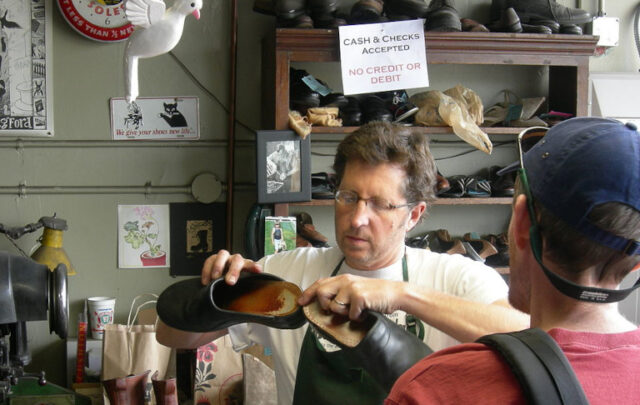We remain wilfully blind to the fact that this festival of credit cannot go on. Only politics can save us now
It is always rather unsettling when the financial pages grab your attention. But there are such profoundly obvious messages from the latest Bank of England warning about house prices, and the more general unease about petrol-driven inflation, that no vaguely alert person can afford to look the other way. All around us, in sunny avenues and crescents across Britain, the property mania is raging; and on the traffic-clogged streets between the over-priced houses, the great car economy is visibly overheating. South Sea shares, anyone?
House prices are now a fifth – 20% – higher than a year ago and have doubled in the past five years. Yes, this is a crowded, buzzy little island in which we have built too few new houses, but even so … these increases are surely ludicrous. Prices have been rising sharply since before Tony Blair came to power and have rocketed in the past few years, creating a dizzying illusion of mass wealth that has in turn fed the continuing consumer boom.
People with perfectly ordinary semi-detached houses or urban flats are told they are worth many hundreds of thousands of pounds more than they were a few years ago. No wonder our heads are turned and we borrow to the hilt to keep buying, not just property but holidays, furnishings, garden makeovers and flash new cars. It began in the south and spread nationwide. For those who already own their home, and that is the majority, the long boom has been a head-turning festival of credit. It’s as if the country is, in an economic sense, a little inebriated.
Not the whole country, obviously: the sober millions doing those crucial jobs in schools and hospitals, cleaning our cities and offices, policing the streets and running local services now often find themselves unable to live near to their work. House prices, particularly in the south-east, are way beyond what public sector wages will afford. As the property booze-up gets ever louder, many are excluded, their worried noses pressed to the windows, looking in. But all of us, outsiders and insiders, are connected because if prices become unaffordable, they eventually fall.
If you take a fairly straightforward measure of affordability, the ratio of house prices to average earnings, then we are at a peak even higher than those of the early 70s and mid-80s, both of which led to dramatic crashes, with the miseries of negative equity and family bankruptcy.
But for now, on it goes. There are plenty of families who are not content with one home, but have bought two, or even more, either to rent or just because they can – or because it seems a better bet than a pension fund. It’s considered daft not to keep on extending yourself. Go on! Have another one … you can manage it. And as with any price-driven mania, there are hyperactive pushers dedicated to keeping it going. The glossy house-porn magazines shoved through letter-boxes; the plaintive personalised letters from estate agents whispering about obscene local price rises and urging you to sell; and, most sinister of all, the credit industry itself. Their ads speak for themselves, with their come-on-sucker enthusiasm about “enhanced income multiples … no proof of income … difficult case specialists … special deals on remortgages”.
All this promotes a greedy short-term consumerism I cannot believe will last. One visible emblem of it is the spread of ever bigger and faster new cars. The roads in many suburban neighbourhoods are increasingly crammed with top-of-the-range sports cars, which still have to crawl along at 15mph, or huge shiny 4x4s. Yet the petrol economy itself is under pressure, with recent price rises provoking the first fuel-tax protests of this parliament, and fuelling a rise in general inflation.
That too cannot go on. It may be true that the recent oil price jump has been driven by the murderous activities of Saudi militants and the arrival of China as a fully industrialised force. But as with house prices, we all know that the assumptions of carrying on just as we are – in this case with ever-greater mobility by road and air – are ultimately mad. It is not just about carbon emissions. It is about scarcity, too. BP has apparently just reassured everyone about the amount of oil left in the world – some 1.15 trillion barrels, apparently. This will keep us going for 40 years. And this is reassuring? Even allowing for new oil finds, it suggests that the carbon economy will have run into the buffers by the time my children are my age.
We know these things. But we behave as though we don’t. The consumerist enthusiasms we inherited so strongly from the Thatcher years – she remember, was a prime minister whose popularity was intimately linked to a house-price boom, and who coined the phrase “great car economy” – have been encouraged to rage unchecked in the Labour years. They haven’t brought us, I would say, great happiness. The sad case of Joyti De-Laurey, jailed for seven years for stealing millions from her greedy male bosses at Goldman Sachs, is surely emblematic of our times. She wanted the baubles, too. Everyone does. Did she do more damage to our society than the ridiculously rich people she ripped off?
In the end, only politics can save us. It can help in the short term. It is absolutely true, as the Treasury points out, that inflation and therefore interest rates are far lower now than during the Wilson or Major property crises. Good old prudent, long-serving Gordon has changed the national psyche and perhaps our assumptions about stability will help prevent a hysterical crash following a hysterical boom. Without mentioning the chancellor by name, this was the reassurance Tony Blair reached for at his press conference this week. A sceptical financial journalist suggested that with household debt secured on overpriced houses now approaching the UK’s annual GDP, the government had a problem. No, said Blair, we have stability and low interest rates. It’s all fine.
Maybe. I cannot quite understand how an economy can be stable when it contains such a huge and central instability as rocketing house prices and debt. What we must all understand is that we live in a society founded on consumer mania and an unsustainable property boom. Our dreams of freedom are tied to the promise of ever-increas ing mobility based on a raw material that will be used up in four decades’ time. Who knows – by then science may have come up with a cheap, viable alternative to oil, but we seem to have been hearing that such alternatives are just round the corner for years.
The real task for progressive politics is to draw our attention to the longer-term consequences of our short-term obsessions, and lead us to consider more dignified values before it’s too late. This is frightening for any politician because it runs so much against the temper of the times – the rage of the times, we had better say. So when the bank governor, Mervyn King, used rather timid language to speak an obvious truth – that house prices are unsustainable – ministers react with outrage. They don’t need to. We all know what’s going on. Don’t we?





